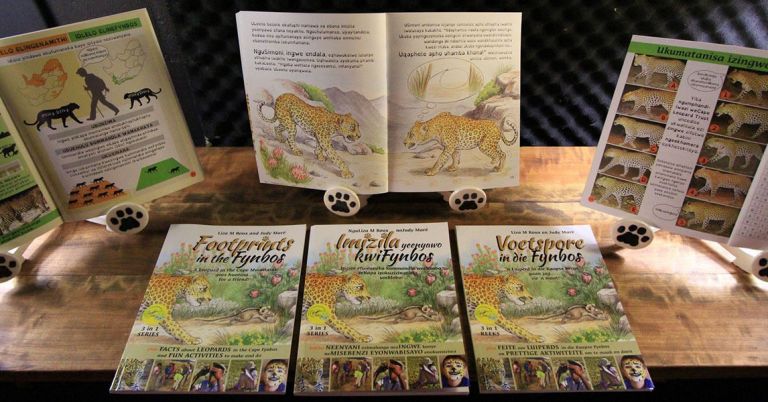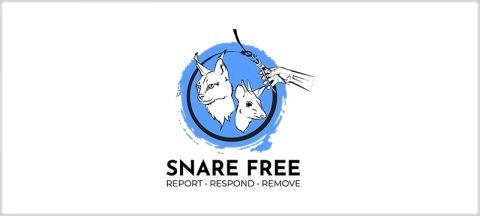Towards the end of 2020, the Cape leopard Trust announced the launch of a conservation-themed children’s story and activity book called “Footprints in the Fynbos” (original English version) and “Voetspore in die Fynbos” (Afrikaans translation). The project was a collaborative effort drawing on 16 years of CLT research, the lyrical writing skills of children’s book author Liza M Roux and the engaging illustrations of Judy Maré. These books, typeset in a dyslexic friendly font, quickly became very popular, and quite organically the project continued to grow in leaps and bounds. From the outset the vision was to make the project as inclusive as possible to reach a broader community of children, to address gaps in the education sector for more accessible resources, and it became clear that more versions and translations of the book were needed.
This vision culminated in the launch of a number of unique resources related to the book celebrating International Literacy Day, 8 September 2021. These education tools include the Xhosa translation “Imizila yeenyawo kwiFynbos”, a South African Sign Language video interpretation of the story, audiobooks in English, Afrikaans and Xhosa, a Braille series and the new release of a children's song, Leeto the Leopard. An intimate launch event, hosted at Mothership Studios in Philadelphia and attended by partners and collaborators of the project, included an inspirational talk by Bonita Blankenberg, sneak peeks at the SASL video, audiobooks and playback of the Leeto song. All speeches and audio were accompanied by SASL interpretations.
What once seemed like a dream has now become a positive legacy created by the Cape Leopard Trust to connect more children to nature.
More information about the resources:
The Xhosa translation
The CLT was determined to produce a Xhosa book. Similar to the English and Afrikaans versions, the book would consist of 3 sections – a leopard focussed story, a facts section and activity pages. Set in the Cape Mountains, the story follows Leeto the leopard on his journey to find a friend, meeting many characters along the way and learning valuable life lessons. The second part of the book is a selection of easily digestible leopard facts, while the final section is fun activities for young and old.
The overarching goal was to offer an accessible and entertaining activity book aimed at participants between the ages of 7-14, introducing children to leopards and the CLT, explaining the importance of conservation and encouraging youngsters to take interest and pride in their natural environment. The book has been developed in engaging fun-to-read and easy-to-follow prose. Rather than being presented didactically, the learning outcomes are approached in a playful, interactive manner. The educational teaching and learning resources contained in the book are aligned with the South African school curriculum, and the book is written in a dyslexic-friendly font with weighted characters.
Availability:
The books are for sale at the recommended retail price of R160 per copy from the Cape Leopard Trust’s online shop and other retailers. For every book sold the CLT gifts a book to an underserved child.
The Xhosa book project was made possible by the Otto Foundation and Mapula Trust.
The South African Sign Language video
Together with the University of Stellenbosch’s Hand Lab team, the Cape Leopard Trust produced a SASL interpretation of Leeto’s story. A video interpretation of the story features an interpreter signing the story in SASL, overlaid on the pages in English or Afrikaans.
For hearing-impaired children, learning to sign at a young age is essential to develop language and literacy skills. Making videos available in sign language, particularly SASL, is a valuable teaching tool for teachers and home school parents. It is a way to teach children new vocabulary in the local context. Due to a shortage of local resources, many educational resources for the hearing impaired are borrowed from Europe and America. These are often not compatible with SASL and sometimes cause confusion. The CLT’s SASL interpretation hopes to contribute to filling this void. In addition to the videos, a national curriculum activity around this version of the book is currently under review for inclusion by the Department of Education for learners with hearing impairment.
Availability:
These SASL videos are available on the CLT Environmental Education YouTube channel.
The Sign Language project was made possible by Mapula Trust and the National Lotteries Commission of South Africa.
The audiobooks
With the help of three South African celebrities, Darren Simpson, Armand Aucamp, and Zolani Mahola, audiobooks were recorded in English, Afrikaans and isiXhosa at Mothership Studios in Philadelphia. Each audiobook consists of the story, a memory game, an animal sound game, and the song ‘Leeto the Leopard’.
In addition to forming part of the resources for visually impaired learners, the audiobooks provide good examples of fluent and interpretive reading, teach critical listening and provide a way to learn the patterns of language and expression. The audiobooks introduce learners to a new genre that students might not otherwise consider and provide a bridge to important topics of discussion on nature for parents and children who can listen together.
Availability:
The audiobooks are downloadable from the Cape Leopard Trust website with the option to donate towards the project. The full set of audiobooks preloaded onto a branded USB can also be purchased from the CLT online shop.
The audiobook project was made possible thanks to the Mapula Trust.
The Braille series
In an exciting and unexpected development, the English, Afrikaans and Xhosa stories have also been brought to life in braille. The braille embossed books are fitted with a unique QR code which, when scanned, opens an audio version of the story which can then be followed in braille. Braille resources enable blind or partially sighted people to enjoy reading and provide an opportunity to access education and independence. However, braille resources are expensive and scarce. Learning braille and having access to up-to-date braille resources from a young age helps improve literacy in an important sector of our society.
The braille resources are integrated into the Cape Leopard Trust’s education programme and available to the general public. Contact Chris Eksteen by email ([email protected]) for more information.
Availability:
The braille files are available for download from the Cape Leopard Trust website and are compatible with most braille readers and displays.
The braille project was made possible by the Oak Foundation.
The Leeto the Leopard song
‘Leeto the Leopard’ was written (lyrics and melody) by one of its own, CLT’s Environmental Educator, Naas van Jaarsveld (aka Naasveld). Pianist Pedro Kruger composed and performed the song accompanied by the lovely voices of Mia, Nina and Inge Dippenaar. The song was recorded and mixed by Henry Steel Jnr at Mothership Studios and will be used to introduce children to the leopard and nature as part of the education programme.
Availability:
This catchy song forms part of the audiobook, and an animated music video is currently in production and is scheduled to premiere on YouTube on Kid’s Music Day (1 Oct 2021).



















